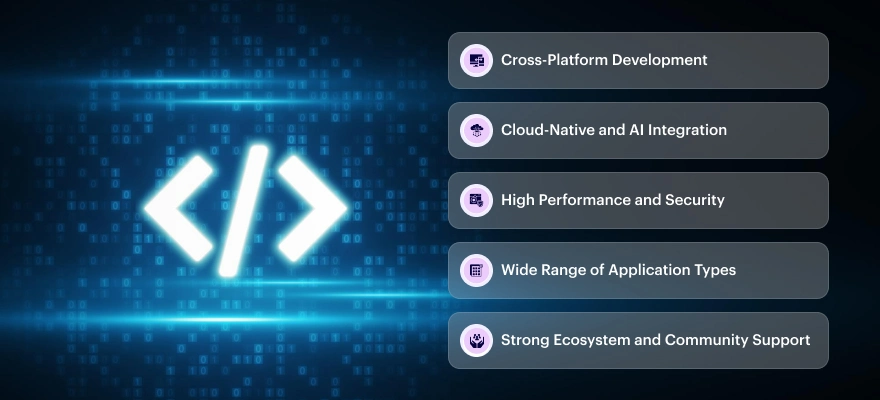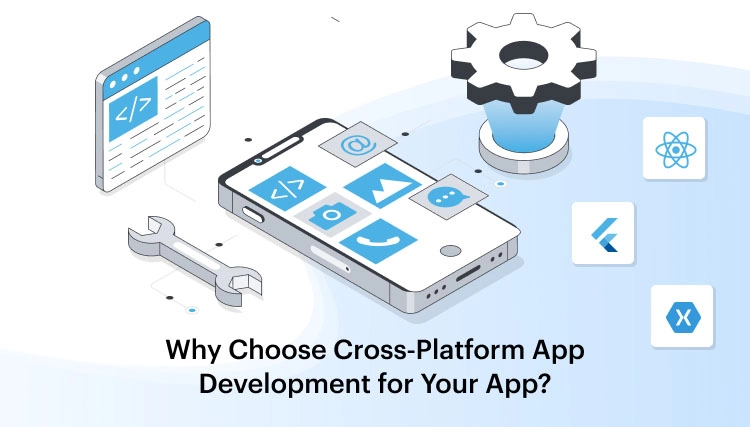What Makes .NET Programming Languages Best for Modern Apps?

Table of Contents
The demand for valuable applications has by no means decreased. Businesses are under pressure to provide brief, steady, and scalable digital solutions, ranging from banking apps that manage thousands of transactions each day to fitness trackers that sync with devices. The .NET programming languages stand out as one of the strongest selections for builders and organisations alike.
According to Statista, the worldwide software program development market is expected to reach $1 trillion by 2030, and frameworks that assist cross-platform and cloud-ready packages. For companies making plans to scale, choosing the proper .NET development business or .NET development services partner can make the difference between a good app and an exquisite one.
Originally developed by Microsoft, the .NET framework programming languages like C#, F#, and Visual Basic have developed into a powerful tool that meets the needs of contemporary app development.
They provide everything from sturdy security and high overall performance to flexibility across structures, including web, mobile, desktop, IoT, or cloud-native application. For organisations making plans to scale, choosing the proper .NET development services partner can make the difference between a good app and an exquisite one.
A real-life example of this performance is seen in Stack Overflow, running on .NET platforms and handling more than 100 million visitors each month. The reliability of the .NET framework ensures that high-traffic structures can continue to operate for users without interruption.
With the rise of AI integration, cloud computing, and cross-platform development, the need for skilled teams in this technology is greater than ever. In the subsequent sections of this blog, we’ll discover why the .NET programming language continues to be the pleasant choice for constructing applications.
Unlock Web Development Potential for Your Business Today
From roadmap to execution, we’ll help you implement AI that drives measurable growth.
Why are .NET Programming Languages Popular for Modern Apps?
Modern apps are supposed to be fast, scalable, secure, and go-platform. Businesses are turning to the validated era to meet these needs, consisting of cloud-local banking apps and AI-powered business platforms. Among them, .NET programming languages stand out as a top choice for developers and businesses looking to create future-ready solutions.
Here’s why .NET continues to gain popularity in the modern app landscape:

1. Cross-Platform Development
Since .NET Core has developed into the unified .NET framework, developers may additionally use .NET MAUI to create applications that function perfectly on Windows, Linux or macOS. This lowers the price and time to market for a .NET development business enterprise by making it less complicated to design apps with a single codebase.
2. Cloud-Native and AI Integration
As more companies in the UK shift to the cloud, .NET provides great support for serverless functionalities in Azure, microservices, and containerisation (Docker, Kubernetes). Additionally, it connects with .NET frameworks for AI and machine learning, allowing for scalable applications. Businesses can effectively implement these trends with the assistance of a UK’s DOT NET development company.
3. High Performance and Security
Modern apps want to deal with heavy visitors and sensitive data. Speed and protection are assured by means of .NET just-in-time compilation, sophisticated garbage collection, and incorporated security libraries. Because of the agency-level dependability that the platform offers, many organisations decide to rent .NET developers.
4. Wide Range of Application Types
From web and desktop applications to IoT devices and games, supports. Dot Net supports almost all matters. Why is this flexibility seen in industries from finance to health care?
5. Strong Ecosystem and Community Support
Backed by Microsoft and a worldwide developer network, .NET gets common updates, ensuring it stays aligned with current development practices. This guarantees long-term aid for organisations that put money into .NET development services.
In essence, the cross-platform capabilities, cloud-ready, overall performance, and protection have made .NET development a trusted basis for modern apps.
Which .NET Languages are Most Widely Used today?
Though many programming languages are supported via the .NET environment, only a select few are most frequently used to develop current packages. While operating with a .NET development company or .NET developers, organisations can choose which of these programming languages to prioritise. Everything from organisation apps to cloud-based structures is made feasible by way of those languages.
Here are the most used .NET languages today:
1. C#

The most popular desire among builders globally is C#. As a result of its security, object-oriented structure, and flexibility. C# is used in the entirety from laptop programs to cloud-native microservices. Cross-platform abilities via .NET 6/7, and reference to Azure, it’s far the language of choice for most projects. C# is often the most famous preference for businesses in search of DOT NET development services or working with a .NET development company due to its scalability.
2. Visual Basic .NET

Although C# is a commercial application, it is popular with companies that require an easy transition from outdated Visual Basic systems to the .NET framework programming language environment. Furthermore, VB.NET is widely recognised for being legible, which makes it simpler for teams with extraordinary skill levels to maintain old applications.
3. F#

Within the .NET framework, F# is a functional-first language that builders run on problematic statistics technology, analytics, and AI-driven. F# is becoming increasingly more popular in fields that call for overall performance computing due to its capability to manipulate mathematical modelling and asynchronous programming. Businesses that need to apply AI, system monitoring, or financial modelling regularly work with a .NET software development company that specialises in F#.
4. C++/CLI

C++/CLI serves as a bridge between traditional C++ and the .NET ecosystem. This language is frequently used while organisations want to integrate existing local C++ applications into modern .NET development environments. For industries wherein performance and legacy compatibility are crucial, running with a specialised .NET development offering ensures efficient transitions without compromising on.
How Does .NET Support Cross-Platform App Development?
Windows, Linux, macOS, iOS, and Android apps are all powered by the .NET programming language. Developers can develop and install the .NET Framework due to its ongoing evolution, which has led to its expansion into .NET Core and .NET 6/7/8.
Here’s how .NET supports cross-platform app development:
1. Unified Development with .NET Core and .NET 6/7
Windows is not the best platform for .NET applications. Developers can utilise a single codebase to create apps that run on exclusive working structures with .NET Core and later versions of .NET. This makes it simpler for businesses to work with a .NET development company to create apps that are ready for the worldwide market by development time and expenses.
2. Xamarin and .NET MAUI for Mobile Apps
Xamarin, and its successor, .NET MAUI, allow developers to build native mobile apps for iOS and Android. Businesses can reach wider audiences without separate codebases for every platform. For companies partnering with a .NET development company, UK or international providers, this translates into faster delivery and reduced maintenance overhead.
3. Cloud-Native and Microservices Ready
Modern applications depend upon cloud-based architectures and microservices. With built-in support for Docker, Kubernetes, and Microsoft Azure, the .NET Framework is right for creating scalable, multi-platform applications. This makes it a top desire for businesses that depend on a .NET software program development.
4. Consistent Performance Across Devices
Whether it’s a desktop app, web portal, or mobile solution, .NET guarantees constant performance across systems. It’s just-in-time (JIT) compilation and ahead-of-time (AOT) compilation that assist in optimising apps for every tool. This is valuable for groups investing in .NET development services to deliver dependable applications.
5. Strong Ecosystem and Tooling
Developers gain from a strong environment that includes Visual Studio, Visual Studio Code, and GitHub integration. These technologies speed up and grow the efficiency of cross-platform services, allowing groups to hire .NET developers for complicated, multi-platform projects.
Smarter Decisions. Faster Outcomes.
Leverage expert web development consulting to cut costs, boost efficiency, and stay ahead of competitors.
How is .NET Driving Cloud-Native and AI-Powered Solutions?
These abilities are being made viable by means of the .NET programming languages, which provide agencies the means to expand shrewd and future-ready apps. More than just clean operation is needed for current applications; they need to leverage the strength of the cloud, which includes AI and system learning.
Here’s how .NET is driving innovation in cloud-native and AI-powered solutions:
1. Seamless Cloud Integration
The .NET Framework integrates natively with cloud platforms, in particular Microsoft Azure, allowing builders to deploy scalable and stable cloud programs. Organisations operating with .NET development business companies in the UK can build microservices, serverless applications, and containerised solutions that run successfully within the cloud.
2. Support for AI and Machine Learning
With libraries like ML.NET, .NET affords a sturdy environment for building AI-powered solutions immediately within familiar .NET development environments. This makes it less difficult for groups to enforce predictive analytics, recommendation engines, and intelligent automation without having separate tech stacks.
3. Microservices and Containerization
Contemporary .NET development services function microservices, which permit services to be modular and independently deployable. When paired with Docker and Kubernetes, cloud-local scalability, improved overall performance, and reduced downtime can be positive for organisations that intend for excessive reliability.
4. Real-Time Data Processing
AI-driven programs regularly require real-time data analysis. .NET programming languages like C# and F# guide asynchronous programming and reactive extensions, supporting builders to create responsive apps that can process huge volumes of data efficiently.
5. Cross-Platform AI Solutions
By leveraging .NET framework programming languages, developers can construct AI solutions that run throughout the internet, desktop, and mobile platforms. This guarantees that companies partnering with a .NET software program development employer can deliver regular consumer reviews, no matter the tool or running device.
What’s the Difference Between .NET Framework and Modern .NET?
As groups increasingly adopt the present-day era, experiencing the difference between the traditional .NET Framework and the modern-day .NET platform has emerged as crucial. While both enable utility development, they serve slightly different functions and aim at different types of initiatives.
|
Feature |
.NET Framework |
Modern .NET (.NET 6/7/8) |
|
Platform and Compatibility |
Primarily Windows-based; used for desktop and legacy enterprise apps. |
Cross-platform; supports Windows, Linux, macOS and cloud applications. Ideal for businesses working with a .NET development company in the UK. |
|
Performance and Scalability |
Stable and reliable but optimised mostly for traditional Windows environments. |
High performance with just-in-time (JIT) compilation, better memory management, and for high-traffic apps, cloud-native services, and AI solutions. |
|
Support and Updates |
Limited updates; mainly security and maintenance for legacy systems. |
Actively maintained with regular updates; aligned with the latest development trends. Preferred by enterprises that hire .NET developers for long-term growth. |
|
Application Types |
Desktop apps, internal enterprise solutions, legacy systems. |
Web applications, mobile apps via .NET MAUI, cloud-native microservices, and AI-powered solutions using ML.NET. |
|
Development Tools |
Visual Studio support; compatible with multiple .NET framework programming languages. |
Enhanced tooling, debugging, and integration with cloud services, enabling .NET development services to deliver complex applications efficiently. |
Why Should UK Companies Hire .NET Developers?
Hiring .NET developers makes strong business sense in 2025 and beyond. Here are key reasons why UK companies benefit from investing in .NET development services:
1. Strong Demand, Limited Supply = Strategic Advantage
The UK’s job market continues to show consistently high demand for .NET developer roles, especially at mid-to-senior levels. With many businesses modernising legacy structures, constructing cloud apps, and incorporating AI/ML talents, hiring skilled .NET builders offers companies a competitive benefit in handing over strong and maintainable solutions.
2. Modern .NET Ecosystem & Frameworks
The .NET Framework supports cross-platform development, performance optimisations, microservices/field architectures, and cloud-native deployments. A .NET software program development organisation can leverage this to create scalable, high-performance .NET APIs, enterprise applications, in addition to mobile and desktop clients using .NET language equipment like C#.
3. Cloud Integration & DevOps Native
UK agencies require programs which can be DOT NET development services that combine well with Microsoft Azure, which includes serverless services, containers, and managed offerings. .NET development teams generally adopt CI/CD pipelines, which reduces deployment hazards and speeds up time to market.
4. Full-Stack & Cross-Discipline Capabilities
A peculiar feature of the .NET programmer is their ability to work with an interface with Backend Framework, Front-end Technology, and handle database transactions. This demonstrates how a .NET development company can provide quick .NET development services by reducing code delivery, overhead, and coordinating labour.
5. Cost-Effectiveness & Long-Term Maintainability
It can be highly priced to hire .NET builders within the UK. The .NET code has a good architecture, modular design, automated testing, and APIs. Less rework, fewer defects, and simpler scaling over time are the outcomes of this. In the long term, it is more cost-effective for many UK companies to choose a .NET software development company.
6. Trends: AI, Microservices & Low-Code Architectures
Microservices, low-code architectures, AI/ML features, and hybrid low-code/no-code connectors are all popular trends in app improvement. Businesses are more geared up to develop scalable packages after they hire .NET developers with these abilities.
7. Geographical Flexibility & Remote / Hybrid Working Models
UK businesses, especially those in London, Manchester, Birmingham, Edinburgh, etc., increasingly embody far-off or hybrid working. Many .NET development corporations inside the UK offer remote teams or offshore models that preserve high-quality requirements and time zone collaboration. With the right approaches, hiring far-flung or dispersed .NET developers can help manage fees even as they turn in great work.
Your AI Transformation Starts Here
Get a custom plan built around your business goals—without the tech overwhelm.
How Do You Choose the Right .NET Development Company UK?
When it comes to .NET programming languages and modern app development, choosing the right partner makes all the difference. A company like Chimpare stands out as a trusted .NET development company in the UK because of:
1. Proven Expertise in .NET Framework
Chimpare ensures current solutions by utilising cross-platform tools like .NET MAUI, ASP.NET Core, and the recently released .NET framework programming languages.
2. Cloud & Scalable Architecture
From Azure integration to microservices and containerisation, Chimpare builds applications that scale seamlessly for UK enterprises.
3. Security & Compliance First
With GDPR-ready processes and secure coding practices, Chimpare delivers solutions that meet strict UK industry regulations.
4. End-to-End .NET Development Services
Whether web, mobile, or enterprise software, Chimpare provides full-cycle .NET development services from strategy to support.
5. Local Presence with Global Reach
Based in the UK but with global delivery capacity, Chimpare combines cultural alignment with the flexibility of a modern .NET software development company.
What are the Future Trends That Shape .NET Development Services?
As modern apps evolve, .NET programming languages and related .NET development services are also advancing fast. For companies wanting to hire .NET developers or partner with a DOT NET development company UK, these trends are defining what “best practice” looks like:
1. Blazor + WebAssembly Full-Stack Growth
Instead of using JavaScript frameworks, C# developers are increasingly embracing Blazor to create rich front-end applications. Blazor is turning into a more mature approach for full-stack .NET development because of upgrades in overall performance, tooling, and developer templates with current releases.
2. Cross-Platform UI with .NET MAUI & Unified Frameworks
The drive to reduce time-to-market and maintenance costs is pushing more .NET software development companies to build apps for multiple platforms from one codebase. The .NET MAUI is central here an also, the unified .NET model helps streamline .NET development services.
3. AI/ML Integration & Intelligent Services
The .NET growth rapidly increases intelligence through integration of ML.NET, Azure Cognitive Services or Onnx/TorchSharp model. The latest ML.net versions improve the support for deeper learning scenarios, and .NET developers make it easier to hire those who can build smart features.
4. Cloud-Native, Microservices & Serverless Architecture
Trends include serverless functions, containerization, microservices, and event-driven architectures. DOT NET development services providers are expected to offer these capabilities. This allows .NET development companies in the UK to deliver apps that scale with demand, perform under load, and are easier to maintain.
Conclusion
Modern apps want to be speedy, steady, and scalable to satisfy user wishes in addition to being well-designed. The .NET structure and programming languages really come into their own here.
.NET has become a viable option for businesses worldwide due to its cross-platform compatibility and ability to interface with contemporary technologies such as cloud computing, AI, and the Internet of Things. The framework affords the needed control over digital demanding situations, including enterprise systems or web apps.
To make the most of these advantages, working with the right .NET development employer is vital. A professional .NET software program development company in the UK can deliver dependable answers tailored to enterprise needs.
For companies seeking to hire .NET builders, the generation’s constant enhancements ensure long-term value. Simply positioned, .NET remains one of the high-quality systems for building modern-day, future-prepared applications.
FAQs
Enterprises need custom software development to address unique business needs, improve efficiency, and gain a competitive edge with solutions tailored specifically to their processes and goals.
Examples include Enterprise Resource Planning (ERP), Customer Relationship Management (CRM), Supply Chain Management (SCM), Human Resource Management (HRM), and Business Intelligence (BI) tools.
It offers scalability, automation, enhanced data security, seamless integration with existing systems, and long-term cost savings while supporting digital transformation.
The timeline varies based on complexity, features, and customisation, but generally, enterprise software development takes between 4 to 12 months for a full-scale application.

Samuel Meleder
Samuel Meleder founded Chimpare, a global company that builds software solutions. With a passion for innovation and a commitment to helping businesses grow through smart digital strategies, Samuel leads a global team delivering cutting-edge solutions across industries
Found this post insightful? Don’t forget to share it with your network!
Related Articles
Top 10 Mobile App Development Companies in 2026 Worldwide?
Mobile apps have silently subsumed almost every element of our everyday existence. Handling everything from food orders and cab booking to business

Why Choose Cross‑Platform App Development for Your App?
Consider a wonderful app idea you have. You have envisioned every other element that will have clients love it: the

How Can You Create an Android App Step by Step Successfully?
Have you ever given the process of creating the apps you use daily any thought? Like Instagram’s sophisticated camera tools,
